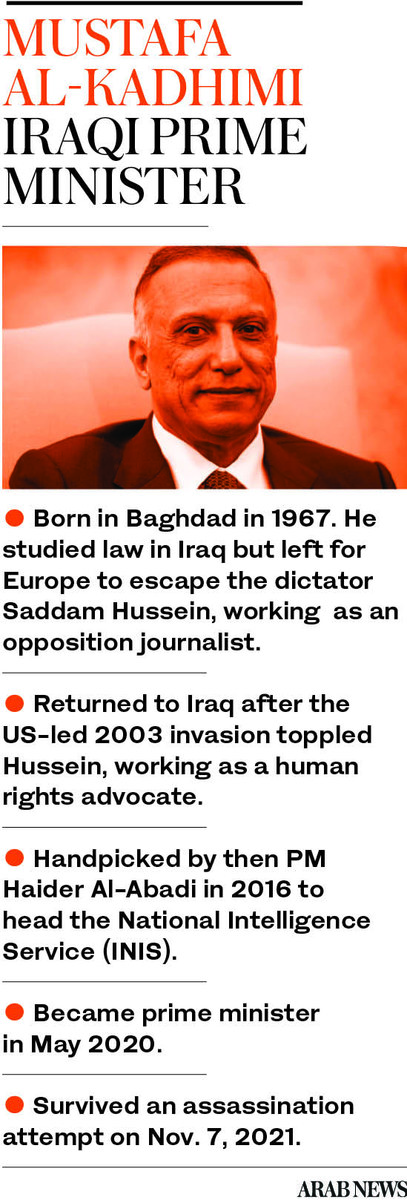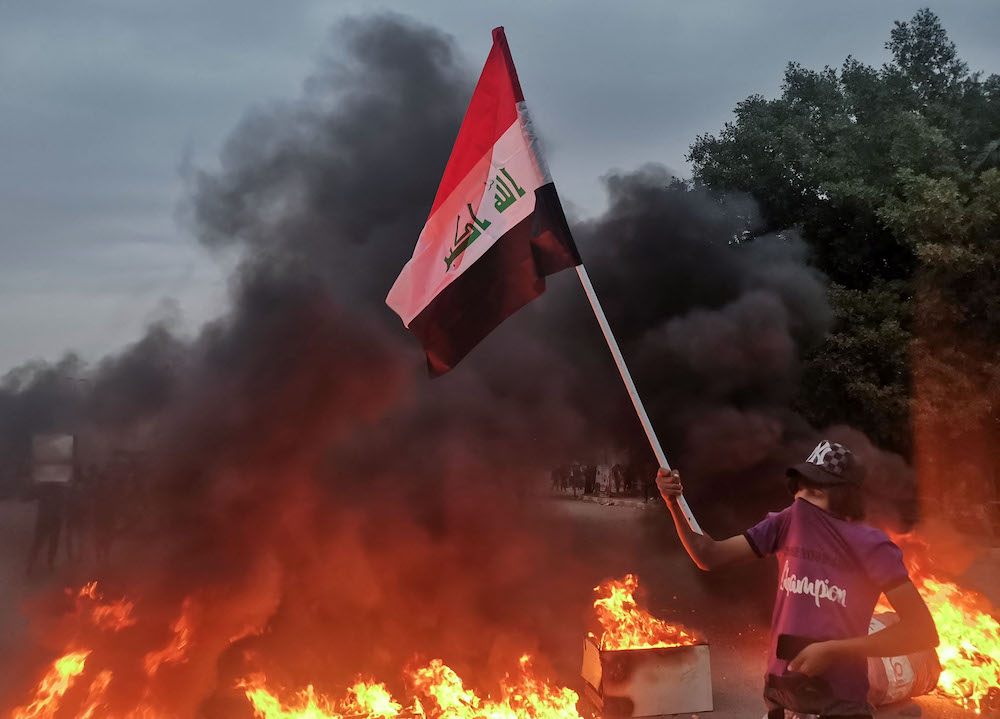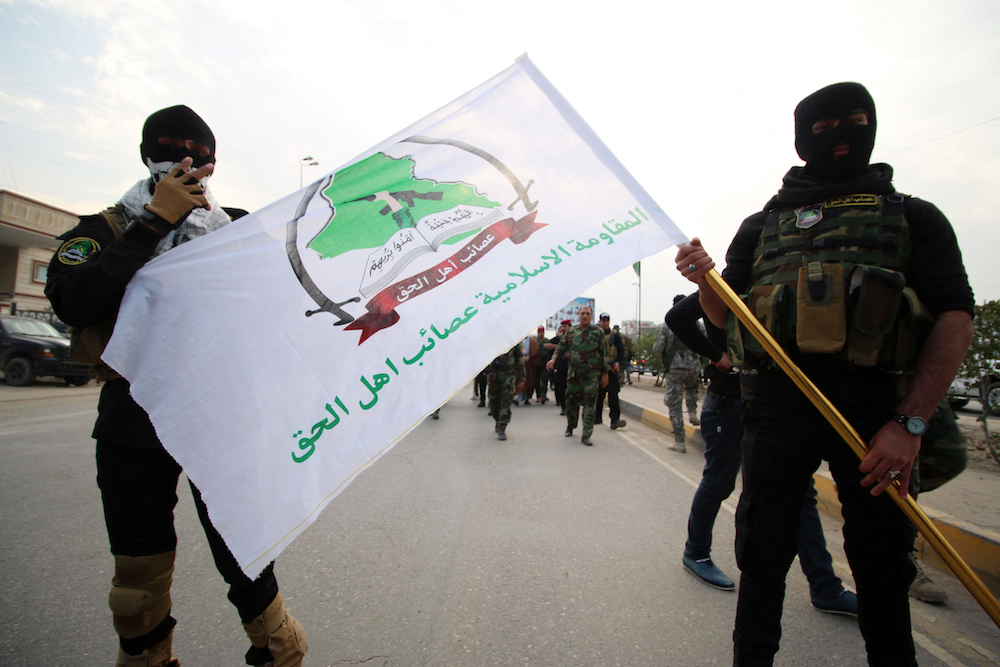How can Iraq’s destructive pro-Iran militias be tamed?
IRBIL, IRAQI KURDISTAN: Iran-backed Iraqi militias have rejected the results of Iraq’s October parliamentary election, in which their political wings performed very poorly, and elements among them may well have been behind the attempt on Prime Minister Mustafa Al-Kadhimi’s life earlier this month.
But can anything be done on a practical level about the malignant menace of Iraq’s pro-Iran militias?
For years now, there have been widespread fears that the Iran-backed elements of Hashd Al-Shaabi (or Popular Mobilization Forces) have amassed enough fighters and weaponry to outgun the Iraqi Security Forces and pose a Hezbollah-style threat to the Iraqi government and state.

That could lead to Iraq’s “Lebanonization” — a situation whereby a powerful well-armed Iranian proxy, borrowing from Hezbollah’s playbook, forcibly imposes its will on the country at Tehran’s behest.
How likely is such an outcome in today’s Iraq, where powerful, armed rejectionist elements are challenging the outcome of an election that was monitored by the UN and even praised by the Security Council?
“The militias are a serious threat, but Iraq’s government and security forces are stronger — in contrast with Lebanon and Hezbollah,” David Pollock, Bernstein Fellow at The Washington Institute for Near East Policy, told Arab News.
READ MORE
Why Lebanon’s Iran-backed Hezbollah is unlikely to disarm voluntarily. Click here to read.
Even so, tackling the militias could prove challenging, even if they are not more militarily powerful than the state. Consequently, Baghdad might need foreign backing. But who could help?
The US has retained a small troop presence in Iraq as part of the multinational coalition it has led against Daesh.
However, under an agreement with the Iraqi government, those troops must only serve as advisers and trainers for Iraqi and Kurdish security forces from the end of this year.
 NATO is taking on a more active mission in Iraq, but that will also be a non-combat training mission to help Iraqi forces tackle Daesh and prevent its resurgence.
NATO is taking on a more active mission in Iraq, but that will also be a non-combat training mission to help Iraqi forces tackle Daesh and prevent its resurgence.
“The main responsibility lies inside Iraq, not foreign help. But friendly powers do support Iraq, and US forces will maintain that mission, just with a new title, after this year,” Pollock said.
“Arab governments also should contribute more to Iraq’s economy and public life, to balance Iran’s interference via its militias. The trend is actually positive in the past two years, and election results largely reinforce that.”
Al-Kadhimi has made substantial diplomatic efforts to foster closer ties between Iraq and other Arab countries during his short time in office. He has established improved links with Egypt and Jordan, resulting in a state visit to Iraq by Egypt’s President Abdel Fattah El-Sisi over the summer, the first such trip by an Egyptian leader to Iraq in 30 years.
The general consensus is that closer economic and political ties with these Arab countries, along with the Arab Gulf countries, could, over time, help reduce Tehran’s heavy-handed influence over Iraqi affairs.
Joel Wing, author of the Musings on Iraq website, says comparisons between Lebanon and Iraq are premature.

“In Iraq, every group wants to be part of the state so that it can exploit the oil money,” he told Arab News.
To be sure, the Iraqi Shiite militias are not a singular monolith eager to do Iran’s bidding in the country. The influential Iraqi Shiite leader Muqtada Al-Sadr, for example, has often opposed Iran’s influence in the country and has called for disbanding and disarming of militias outside of state control.
His alliance was victorious in the election and won far more seats in parliament than the Iran-backed political blocs.
Wing pointed out that the Sadrists and the Iran-backed factions had already fought each other in the past.
“The Sadrists and the Islamic Supreme Council of Iraq had a long-running battle for control of southern Iraq during the US occupation,” he said.
“The 2008 Charge of Knights (battle of Basra) operation was Prime Minister Nouri Al-Maliki’s attempt to take out his rival Muqtada Al-Sadr. So, you have precedent for Shiite parties fighting each other already.”
Wing also noted that the militias had been running amok in Iraq for almost 20 years. “Militias have had the power to largely do as they please since 2003. That’s because they were part of, and supported by, the government. That doesn’t look to be changing anytime soon,” he told Arab News.

Nevertheless, Wing believes that foreign support of the Baghdad government and security forces remains important for the future of Iraq.
“The role the West can play is to continue to support the Iraqi government and security forces,” he said.
“This is not a perfect formula because there are all kinds of problems with both, but to step back would give the pro-Iran forces even more sway in the country.”
Emily Hawthorne, Stratfor’s senior Middle East and North Africa analyst at RANE, told Arab News that there appears to be no sign that Iraq’s militias are “setting aside their aggressive tactics despite pressure from the government.”
“But continued violence will mean they have to tolerate broader, popular backlash against their actions, negatively impacting their electoral popularity,” she said.
PRO-IRAN GROUPS IN IRAQ
Paramilitary:
* Hashd Al-Shaabi
* Asaib Ahl Al-Haq
* Kataib Hezbollah
* Kataib Sayyid Al-Shuhada
Political:
* Fatah (Conquest) Alliance
* Al-Sadiqoun
Similar to Wing and Pollock, Hawthorne doubts that Iraq is on the verge of becoming another Lebanon.
“Both the Lebanese and Iraqi governments struggle to exert full control over state authority,” she said.
“But a big difference between Iraq and Lebanon is the Iraqi federal armed forces are more cohesive, well-armed, and well-trained compared with the array of non-state militias operating in the country. Whereas in Lebanon, Hezbollah is heavily armed and could challenge Lebanese federal forces if it chose.”
Hawthorne does not rule out the possibility of an intra-Shiite civil war in Iraq, but says it is “still more likely to play out in the political realm than in terms of a violent conflict in the streets.”
She believes that while Iraq will have to take the lead in any initiative to combat the militias, foreign assistance is still a very important factor.
“It is true that Baghdad will mostly be on its own in its struggle with the Iran-backed militias for control,” Hawthorne told Arab News.
“But the international support that the Iraqi government has, and which the militias lack, does help Baghdad maintain the financial and military aid that will help the federal government maintain the upper hand.”

Why Lebanon’s Iran-backed Hezbollah is unlikely to disarm voluntarilyMilitia ‘tried to murder Iraqi PM with Iranian-made drones’




